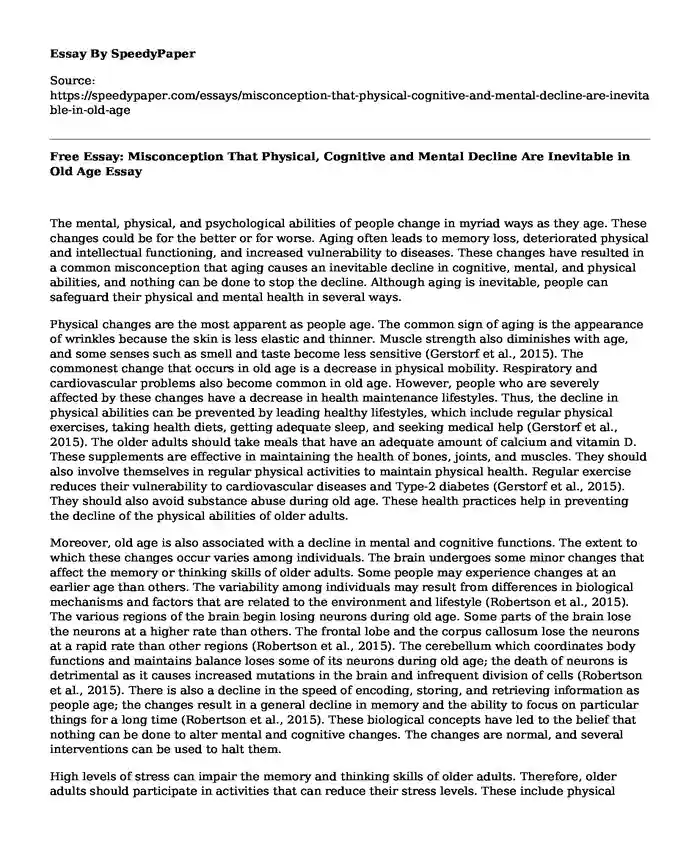
| Type of paper: | Essay |
| Categories: | Anatomy Mental health Community health Lifespan development |
| Pages: | 3 |
| Wordcount: | 704 words |
The mental, physical, and psychological abilities of people change in myriad ways as they age. These changes could be for the better or for worse. Aging often leads to memory loss, deteriorated physical and intellectual functioning, and increased vulnerability to diseases. These changes have resulted in a common misconception that aging causes an inevitable decline in cognitive, mental, and physical abilities, and nothing can be done to stop the decline. Although aging is inevitable, people can safeguard their physical and mental health in several ways.
Physical changes are the most apparent as people age. The common sign of aging is the appearance of wrinkles because the skin is less elastic and thinner. Muscle strength also diminishes with age, and some senses such as smell and taste become less sensitive (Gerstorf et al., 2015). The commonest change that occurs in old age is a decrease in physical mobility. Respiratory and cardiovascular problems also become common in old age. However, people who are severely affected by these changes have a decrease in health maintenance lifestyles. Thus, the decline in physical abilities can be prevented by leading healthy lifestyles, which include regular physical exercises, taking health diets, getting adequate sleep, and seeking medical help (Gerstorf et al., 2015). The older adults should take meals that have an adequate amount of calcium and vitamin D. These supplements are effective in maintaining the health of bones, joints, and muscles. They should also involve themselves in regular physical activities to maintain physical health. Regular exercise reduces their vulnerability to cardiovascular diseases and Type-2 diabetes (Gerstorf et al., 2015). They should also avoid substance abuse during old age. These health practices help in preventing the decline of the physical abilities of older adults.
Moreover, old age is also associated with a decline in mental and cognitive functions. The extent to which these changes occur varies among individuals. The brain undergoes some minor changes that affect the memory or thinking skills of older adults. Some people may experience changes at an earlier age than others. The variability among individuals may result from differences in biological mechanisms and factors that are related to the environment and lifestyle (Robertson et al., 2015). The various regions of the brain begin losing neurons during old age. Some parts of the brain lose the neurons at a higher rate than others. The frontal lobe and the corpus callosum lose the neurons at a rapid rate than other regions (Robertson et al., 2015). The cerebellum which coordinates body functions and maintains balance loses some of its neurons during old age; the death of neurons is detrimental as it causes increased mutations in the brain and infrequent division of cells (Robertson et al., 2015). There is also a decline in the speed of encoding, storing, and retrieving information as people age; the changes result in a general decline in memory and the ability to focus on particular things for a long time (Robertson et al., 2015). These biological concepts have led to the belief that nothing can be done to alter mental and cognitive changes. The changes are normal, and several interventions can be used to halt them.
High levels of stress can impair the memory and thinking skills of older adults. Therefore, older adults should participate in activities that can reduce their stress levels. These include physical activities such as taking morning runs and gardening. In addition to reducing stress, they increase the flow of blood to the brain, which will subsequently better the functioning of the brain (Robertson et al., 2015). Another strategy is living in intellectually, stimulating environments. The aged can engage in cognitive tasks that are challenging to keep themselves mentally active. This will reduce their susceptibility to dementia and Alzheimer's disease; the activities include taking adult courses, reading, and playing bridge (Robertson et al., 2015).
References
Gerstorf, D., Hulur, G., Drewelies, J., Eibich, P., Duezel, S., Demuth, I., & Lindenberger, U. (2015). Secular changes in late-life cognition and well-being: Towards a long bright future with a short brisk ending? Psychology and Aging, 30(2), 301. https://psycnet.apa.org/doiLanding?doi=10.1037/pag0000016
Robertson, D. A., Savva, G. M., King-Kallimanis, B. L., & Kenny, R. A. (2015). Negative perceptions of aging and decline in walking speed: A self-fulfilling prophecy. PLoS One, 10(4). https://www.ncbi.nlm.nih.gov/pmc/articles/PMC4414532/
Cite this page
Free Essay: Misconception That Physical, Cognitive and Mental Decline Are Inevitable in Old Age. (2023, Jul 10). Retrieved from https://speedypaper.com/essays/misconception-that-physical-cognitive-and-mental-decline-are-inevitable-in-old-age
Request Removal
If you are the original author of this essay and no longer wish to have it published on the SpeedyPaper website, please click below to request its removal:
- Literacy and Health Outcomes - Article Review Essay Example
- CBT From a Christian Perspective - Free Essay Example
- Paper Example. Boys and girls club reflection
- Can Starting School Later Help Improve Students Health? Essay Sample
- Mental Illness: Comparing Psychological & Biomedical Treatments - Essay Sample
- Paper Example on Covid-19: Global Disruption of Education Affects 1.6 Billion Learners
- Navigating Agency Discretion: Legal Dimensions and Political Shifts in Administrative Law
Popular categories




